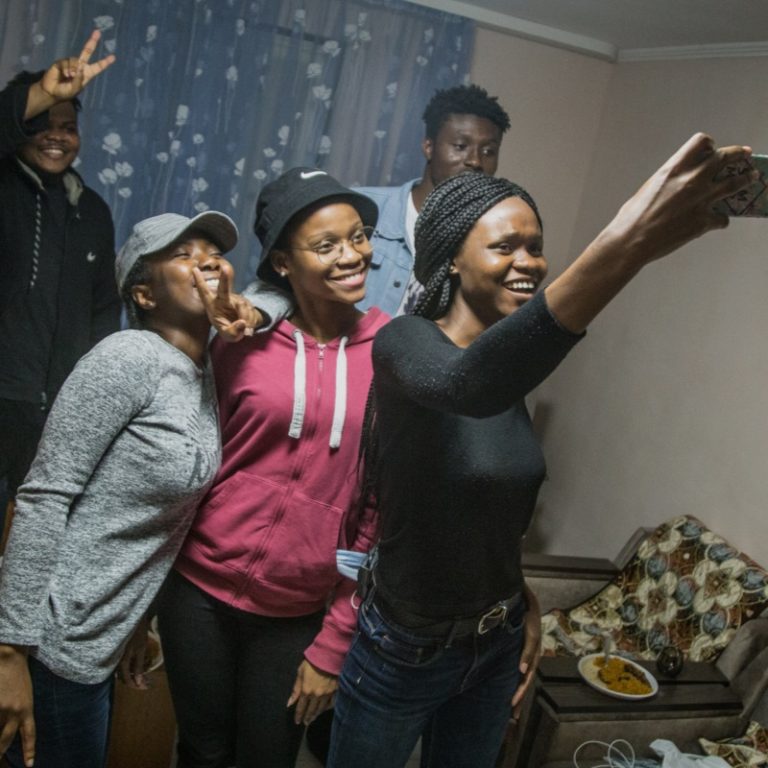This year a music band TVORCHI, started by Ukrainian Andrii Hutsuliak and Nigerian Jeffrey Kenny, made it to the National Finals of the Eurovision Song Contest. A couple of years ago Jeffrey moved to Ukraine to become a doctor. And he stayed. Nowadays more than 30 thousand African natives live in Ukraine, most of whom came here to study and change their cultural setting. Nigerian community is the second largest African community in Ukraine.
In the 1960s in the aftermath of WWII a number of European colonies in Africa became independent states. This event was so remarkable that 1960 was proclaimed the Year of Africa. Some leaders of the new states turned to the socialist political and economic system in order to distance themselves from the Western world. It didn’t take long for the USSR to take new African socialist countries under its wing. Establishment of trade relations, financial support, and invitations to study in Soviet universities strengthened the ties between states of the same regime. That’s how African students arrived to then-Soviet Ukraine for the first time.
During the first years of its independence, Ukraine has renewed diplomatic relations with African countries. The flow of African migrants has increased significantly, but they were not enlisted in the 2001 census. Young Africans come to Ukraine to pursue higher education. Ukrainian universities have gained high popularity in Africa through special agencies that advertise affordable education abroad. They prepare all the necessary documents, secure visas for future students, and bring them to Ukraine in groups.
The NGO “African Council in Ukraine”, which promotes African culture, claims that about 30 thousand Africans live in Ukraine, the majority of whom are students coming from Morocco, Nigeria, and Egypt.
Upon arrival in Ukraine, African young people undergo the stage of adaptation to the climate, society, and food. In order to quickly fall into the rhythm of an unfamiliar Ukrainian city, some of them get to know locals and actively learn Ukrainian. Those who feel uncomfortable in a strange environment look for compatriots and form communities to share memories of home.

Abi
Abekwuchi Chukwumati, or Abi, is a senior at the Faculty of Law at Ternopil National Economic University. Although there are universities in Nigeria, her mother wanted her to study abroad.
“The child of my mother’s friend studied here at Ternopil Medical University, so she recommended this school to my mum. And my mother thought, ‘Okay. It’s a good university, and it’s easy to apply for a visa here.’ So we decided to come here.”
Abi came to Ternopil with her brother James, who is also studying at the Economic University. The girl remembers her first impressions of the new country.
“At first it was too cold for me in Ukraine. Sooo cold. And too quiet, empty outside. A little bit too quiet for my liking.”
The difference in climate seems obvious, but the difference in the concept of volume levels can lead to misunderstanding as Africans generally speak louder than others or listen to louder music. However, this is merely the indicator of a foreign communication culture and by no means — of bad manners. With time, they adapt to the Ukrainian climate and to the local rules of conduct. Therefore Abi got used to the rhythm of the city and she is fond of how unusually quiet it is.

But there’s something you never get used to. Abi and her Nigerian friends have repeatedly fallen victims to hostile stares and derogatory behavior in public transport.
“Once I was riding a bus, and a woman was trying to push me out of my seat. And nobody said anything. They just looked as if it were normal. I didn’t know what to do.”
Racism and xenophobia in Ukraine are rarely discussed in the media, except for isolated public cases, but the problem of intolerance towards other ethnic groups and people with a different skin color, particularly Africans, exists and causes newcomers to leave immediately after graduation. Kyiv International Institute of Sociology conducted a nationwide study showing that the level of xenophobia in 2019 has increased compared to the 1990s. Ukrainians are most intolerant towards Roma and Africans, that’s why the latter build closed communities.
Students from Congo, Ethiopia, Nigeria, and Ghana have separate groups on social media. Sometimes they come together and hold general African celebrations. Abi prefers a small circle of friends.
“I rub shoulders mostly with Nigerians and Ghanians. I don’t know anybody from Congo because they are French speakers and most of them do not understand English — that hinders communication.”
For the same reason, it is difficult for her to find friends among Ukrainians. For the first two years, Abi studied Ukrainian, but this was not enough for fluency in communication.
“I know only basic phrases in Ukrainian. When I go shopping, I know how to ask about the price of the product. Or if I get lost, I just say, ‘Bud laska’ (Ukr. for ‘Please’) and tell the address. And that’s it.”
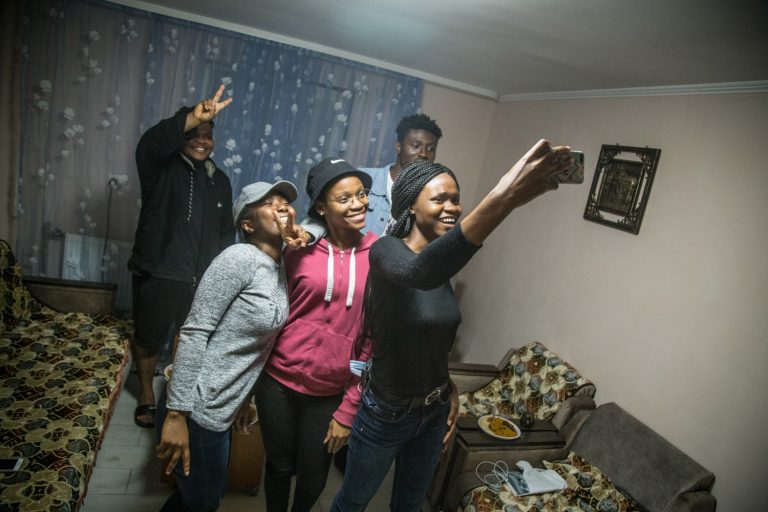
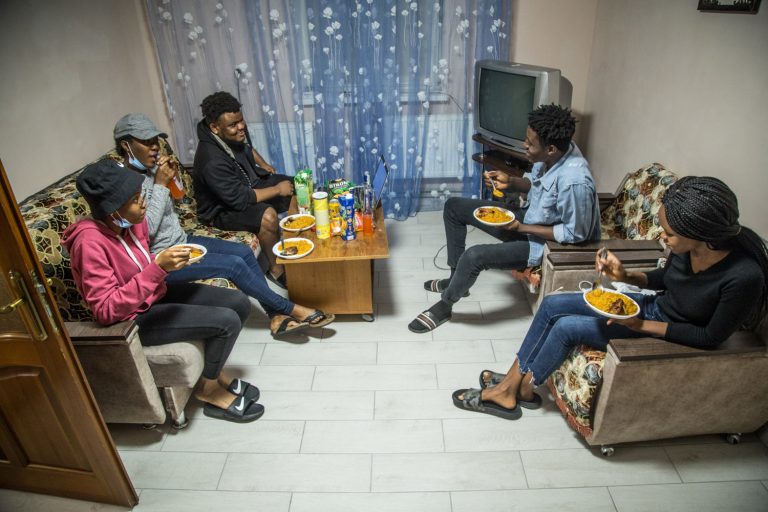
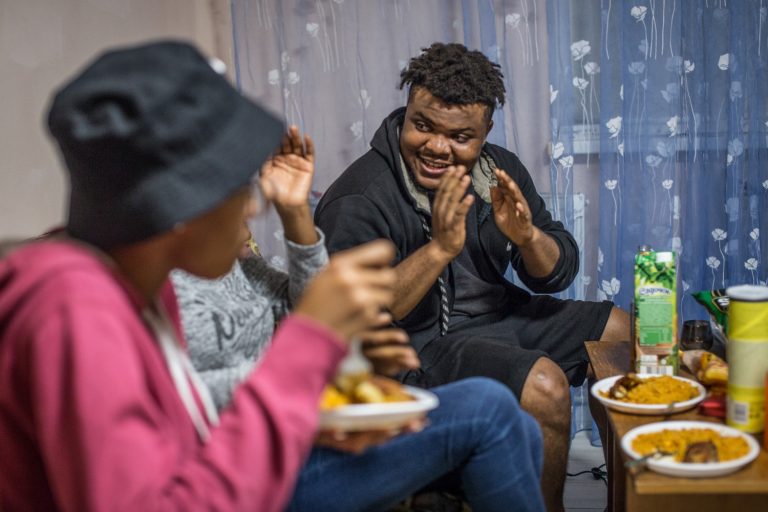
slideshow
The Nigerian community provides company and a sense of home to its members. Students often have house parties with Nigerian cooking, African music, dancing, and socializing. Typically, for such gatherings they cook jollof rice and chicken — adding tomatoes, peppers and a variety of seasonings. It is pretty much the only Nigerian dish that can be cooked from Ukrainian ingredients. If they crave fried plantains (also referred to as green bananas — ed.) or pepper soup, Nigerians visit ‘Afrofoods’.
Nigerian dishes take a long time to cook, including search for the necessary ingredients. Students earn extra money by making traditional dishes for their countrymen. Others sew traditional clothes or make bracelets that they sell within the community. Abi has occupied a niche which currently has little competition.
“Most Africans here (in Ukraine. — ed.) cook African food, and it felt like everyone was doing it. I wanted to do something different, so I decided to try and make beauty products.”
Abi makes her own beauty products — scrubs, lip glosses, body shimmers — and sells it on Instagram to Ukrainians and Africans. Cosmetics of her making are ordered in Kyiv, Ivano-Frankivsk, Sumy, and Ternopil. Over a year she has formed a small customer base and plans to expand her business.

‘Afrofoods’
There are about 3,000 foreigners studying in Ternopil, most of them from Nigeria and Ghana. There is a growing demand for exotic fruits, vegetables, and oils, so the city has two stores selling products from Africa. The one at the central city market has been opened by Kateryna Malitska, who understands perfectly well what longing for ethnic food is.
“When I went abroad, I saw how difficult it is for Ukrainians to buy our milk, butter, potatoes, and how much they miss it. And I realised: foreigners who come here also long for their native food. They all eat Ukrainian food, but miss their own, so I decided to bring a piece of Africa to Ukraine for them.”
There are products from Morocco, Tanzania, Ghana, and Nigeria. Besides Africans, ‘Afrofoods’ is visited by Indians who also miss the variety of spices and sauces.
There is a phrase in Nigeria: “Ẹ̀mí ti ò jata, ẹ̀mí yẹpẹrẹ” — “Life is useless without pepper”. Nigerian food, compared to the cuisines of neighbouring African countries, is famous for being spicy. From teasing jalapeno peppers to fiery habanero — every dish should not just be delicious, but expressive.
Peanuts, or earthen nuts, are an important ingredient in Nigerian cuisine. It is boiled, fried, dried, and used for making oil. Peanut soup is one of the main dishes and is usually served together with fufu — porridge cooked from yams or cassava. These are root vegetables, which by cultivation and methods of preparation are similar to Ukrainian potatoes.

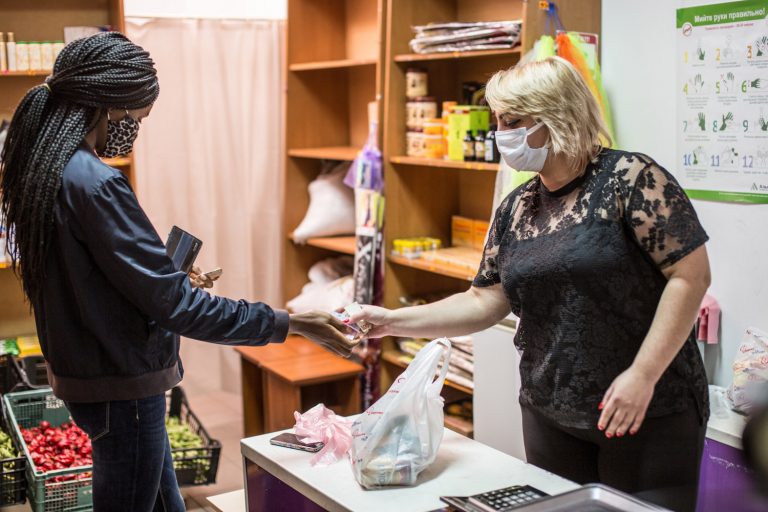
slideshow
Abi sometimes stops by ‘Afrofoods’ for snails and kanda goodies (pieces of fried animal skin) to recall the taste of home, but still looking forward to tasting her favourite dishes in Nigeria.
The African store brings a wave of nostalgia to another Nigerian Jeffrey Kenny, who has lived in Ternopil for 7 years. Here, he recalls his mother’s Sunday dish of pounded yams, beans with red palm oil, and a market where his mother would buy smoked crayfish for delicious soups. He does not cook Nigerian food, but he knows how to order it:
“Telegram has a chat with five to six hundred foreigners (in Ternopil. — ed.), most of them Nigerians. There you can sell something, order food. Sometimes when I want Nigerian food, I order it by simply saying in the chat: ‘Who has food today? — I have it. — I’m buying!’ It’s that simple.”

Jeffrey
In his early years at the Medical University, Jeffrey used to paint portraits for commission, thus earning his living from his hobby. At first, he painted just for himself to kill some time after classes. Soon his neighbours from other dorm rooms started dropping by and taking interest in his paintings. Word of mouth marketing did its magic, and Jeffrey started getting orders for portraits. He painted in the evenings, one portrait took about four days.
“I was doing it to see what it’s like to make money here. It was a good feeling because people were really getting joy and pleasure from my work.”
Jeffrey met his fellow student Andrii Hutsuliak when they were juniors. Andrii was a musician as well. In 2018, they founded a music band TVORCHI.
In Nigeria, Jeffrey sang in a choir and played clarinet in an orchestra. After moving to Ternopil, he bought a guitar and learned to play watching video tutorials on YouTube. Having mastered the basics, he practiced busking.
“Once I saw strangers busking in the city centre. I walked up to them, asked if anyone was singing with them. ‘Would you like me to sing with you?’ And they agreed. Since then, we’ve met dozens of times and just played in the center.”

The musician recalls those times with sincere surprise, because making friends in the street in a foreign country used to scare him. As for most Nigerians, socialization in Ukraine was difficult for him. Ukrainians did not understand English, and Jeffrey was ashamed to speak Ukrainian. He went through the basic level at courses, studied numbers, letters, learned to read and write.
“I gradually learn Ukrainian by listening to the conversations of Ukrainians. But even when I know what to say (in Ukrainian) I remain silent.”
Jeffrey failed to forge a connection with the Nigerian community in Ternopil, because, as he recalls, among foreigners at his faculty were mostly Egyptians. Schedules differed from Nigerian groups, training was difficult, so all house parties were held without him. But since he met Andrii Hutsuliak, Jeffrey was successfully blending into the Ukrainian community.
“When he (Andrii) came up to me, I turned to him and didn’t know what was going to happen the next moment. He suddenly patted me on my shoulder — this has never happened to me. I thought something wicked this way comes. And he just asked, ‘Would you like to join me for a beer?’ I replied, ‘Ok, cool!’. That’s how it all started.”
Jeffrey taught Andrii English, and Andrii taught him Ukrainian. During 2018–2020, their electronic duo TVORCHI released three studio albums, performed on the stages of Ternopil, Lviv and Kyiv, and took part in the National Selection for the Eurovision.
Their songs have neither Ukrainian motifs nor African bits, although Jeffrey’s parents advised him to perform music of his homeland. Music has become the communication force he can use to get along with anyone regardless of nationality. Thus music helped the guy find his place in Ukraine.
“I was ready to change my way of looking at many things. I kind of opened my eyes. Being open is always a benefit, otherwise you can’t accept something new.”
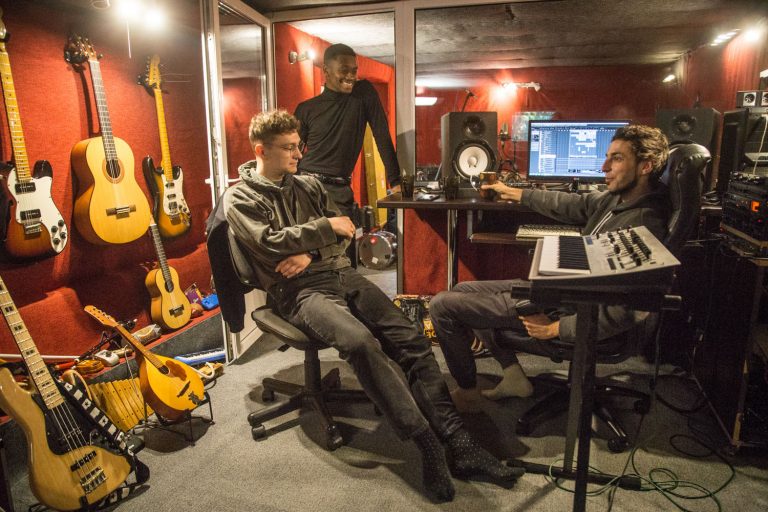
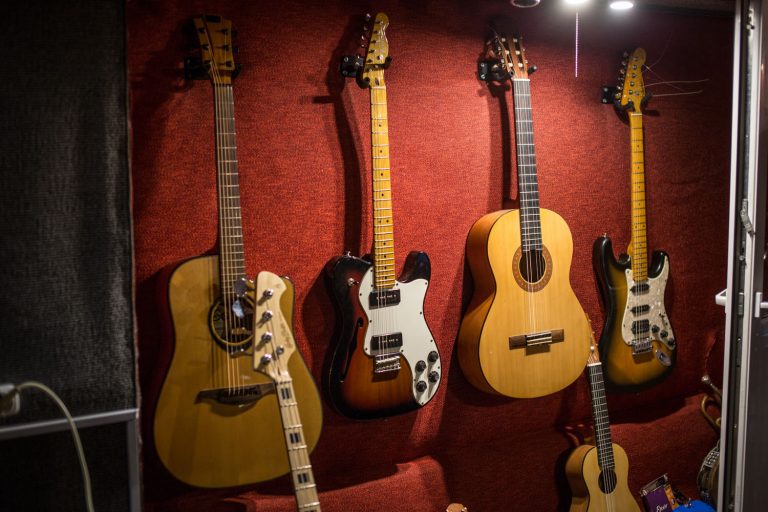
slideshow
According to Jeffrey, this is exactly what Nigerians who come to Ukraine and remain in the confines of the Nigerian community are missing. He calls such closed groups ’rehabilitation centres’. Nigerians are tied not just to their homeland, but to particular people, because even in their native Nigeria they can feel like strangers if they leave their region.
Nigeria is home to about 250 ethnic groups that differ in customs, language, and religious beliefs. The largest of them is Hausa, or Hausa-Fulani, which makes up about 29% of the population of Nigeria. Representatives of Hausa live mainly in northern Nigeria and have a great influence on the political life of the state. They profess Islam and know Arabic, but they communicate with each other in Hausa language.
The second largest population group is Yoruba, whose settlement is located in the southwestern part of Nigeria, in particular in one of the largest cities in Africa — Lagos. Religious diversity differs it from other Nigerian peoples. Some profess Christianity, others are Muslims, and they combine world religions with ancient spiritual practices.
The people of Igbo have long believed in the sole creator Chineke or Chukwu, and after the colonisation 90% of Igbo adopted Christianity. They inhabit the southeastern part of Nigeria. By administrative division, the country consists of 36 states. In Nigeria, there is an unofficial division into cultural regions bearing the names of local peoples: Yorubaland, Igboland, Hausaland, etc.
Independent languages of Nigerian peoples have dialects, which are communicated by individual groups within the same people. The official language of Nigeria is English, however, in order to get on, representatives of different parts of the country use a universal language — Nigerian Pidgin, which is based on English and various local languages.
Jeffrey’s family comes from the people of Yoruba. And although they have their own language, their son speaks English with his parents, which he says is easier. All of his Nigerian friends are Yoruba. In his opinion, the difference between peoples lies not only in language or religion.
“I have a closer connection with them, it’s easier to talk to them because of the way we talk to each other. If I tried to tell a joke to Igbo, they probably wouldn’t understand it. If I told Yoruba an easy joke, everyone would just burst because of how I’d tell it. The reason is our way of talking to each other and understanding each other.”
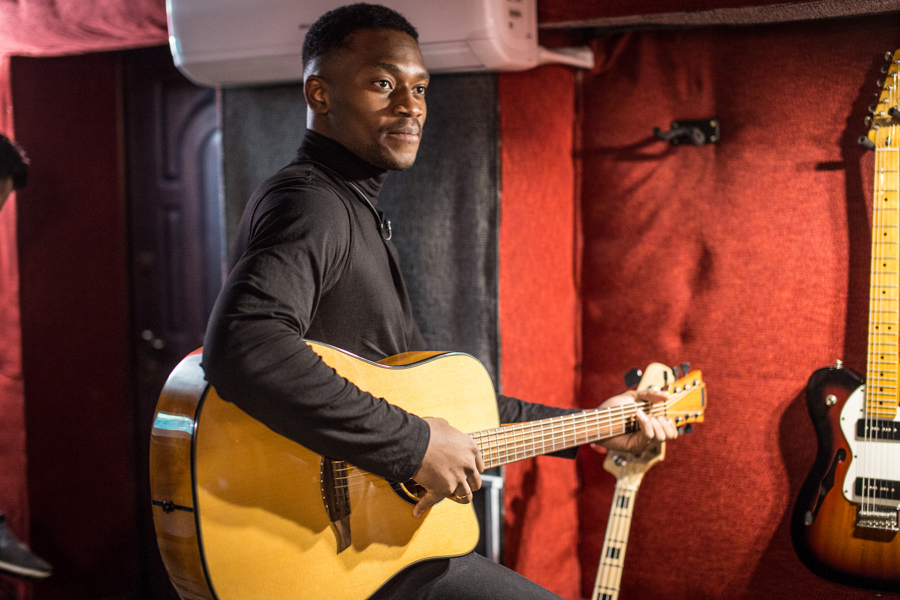
Jeffrey is convinced that, unlike Nigeria, it is easier to get along with each other in Ukraine, at least thanks to a single language. During his years in Ukraine, he managed to find common ground with Ukrainians and notice changes in society.
“About four or five years ago, when I came here, I did not feel that Ukrainians are very open, to be honest. If I had created music back then, it would hardly have been so popular. It’s great to see Ukrainians nowadays enjoy Ukrainian music performed by a non-Ukrainian. It shows that time changes everything.”
supported by
Material prepared with support of United States Agency for International Development (USAID)


